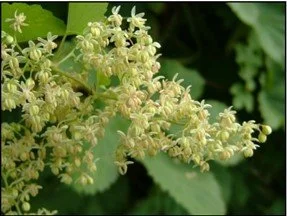Hop Sexism and Inequality
Hops are diecious (Greek for “two houses”) meaning they have both female and male plants. Male plants are relatively useless. They have very small private parts (flowers) and only 1/150th of the amount of prized female resin, and little essential aroma oils. The female plant yields large flowers with lots of golden globules of lupulin. Of all the parts of the hops it is the lupulin that we prize so for beer as it is that which carries the resins, alpha and beta acids, and essential oils. As well as male or female, some hop plants are monoecious, with both male and female flowers on the same plant. These industrious do it yourselfers unfortunately won’t take over the hop world as they only produce infertile seed.
This is a hop flower of a male hop plant. It is markedly different to like cone like flower of the female hop. Source: S.Miller’s Feral Hops Handout.
Control over linage and its associated prevention of haphazard pollination is paramount to commercial yards. Hops are therefore tightly controlled via cutting propagation, weeding out of male plants, and triploid breeding programs to produce new varieties completely sterile. Triploid plants have three sets of chromosomes and are seedless. Triploids include USA’s Willamette and Columbia, AU’s Millennium, and NZ’s Kohatu, Motueka, Nectaron, Pacifica, Pacific Gem, to name but a few. The prophylactic steps to remove males ensure complete breeding control and no bastard half casts. The last thing the respectable establishment wants is wayward, weighed down, seed ladened female cones waddling bare foot around. Young virgin female cones are far more desirable on the meat, I mean beer market, with their plentiful lupulin.
Having all that said and done, interestingly and most cheekily, it is these bastard half cast that have brought us the amazing spontaneous varieties of the very popular Amarillo and Comet* hops we craftily enjoy today, not to mention the original hops that began the whole beer revolution! Despite the establishment, there is certainly something to be said for wild and free loving.
*Comet was released in 1974 but is no longer in commercial production.

